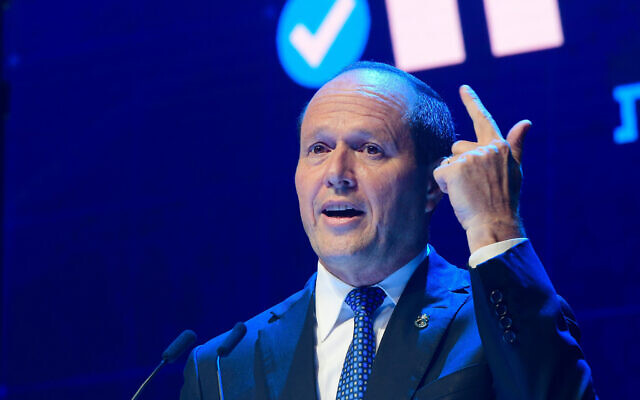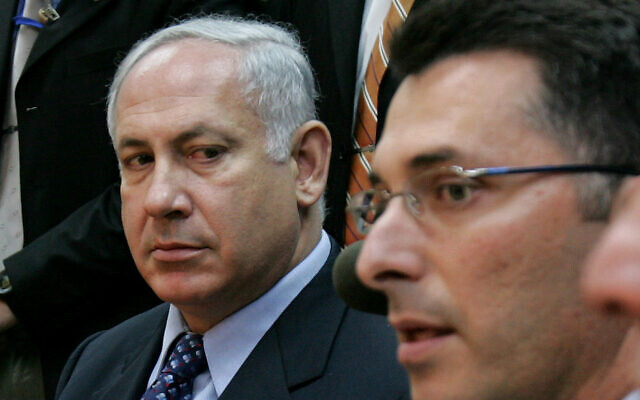In show of strength, former Jerusalem mayor organizes gathering of 4,000 party activists, urges Netanyahu not to hold snap leadership vote as Likud heads to opposition

Former Jerusalem mayor and Likud MK Nir Barkat on Thursday called for the party to unite as they head into the opposition and to delay holding new leadership primaries.
Barkat’s call, at a gathering of some 4,000 Likud activists in Tel Aviv, was seen as a show of strength in the party and an indication he will join a growing list of top Likud officials lining up to challenge Prime Minister Benjamin Netanyahu for the party leadership.
With the so-called “change bloc” of parties set to be sworn into government on Sunday, Netanyahu has signaled that he plans to remain Likud chair and continue to lead the party in the opposition.
According to a recent Channel 12 report, in an attempt to quash possible challengers, Netanyahu is hoping to hold a snap leadership primary that would take place as soon as possible after the new government is sworn in.
But Barkat urged him to hold off.
“This is not the time for internal disagreements or unnecessary primaries. We have to unite and work together to return Likud to government,” he told the crowd that included several senior Likud officials, including party central committee chairman Haim Katz and Likud faction head MK Miki Zohar.
The meeting in Tel Aviv was billed as “presenting a vision for 2021.”
Likud officials are reportedly saying they will not allow Netanyahu call a snap vote, demanding a fair race that will allow Netanyahu’s competitors to prepare their bid for the party leadership. This, however, would require a change in party procedure that would need to be ratified by committees still staffed by Netanyahu loyalists.
Netanyahu convincingly won Likud primaries in 2019 when he defeated a challenge by former party minister Gideon Sa’ar. Sa’ar then left Likud in 2020 to start the New Hope party, which campaigned on not serving in a government under Netanyahu and intends to be part of the new coalition.
Likud has put off holding another round of primaries since then, amid political turmoil that saw four inconclusive elections in two years.
Should the party head to the opposition on Sunday, senior party member Yuli Edelstein, the health minister, plans to challenge Netanyahu for the Likud leadership this time around, Zman Yisrael, the Times of Israel’s Hebrew sister site, reported last week.
Edelstein is popular in Likud, placing first in the most recent primaries, but he is not the only one eyeing Netanyahu’s throne.
Finance Minister Israel Katz told Likud activists last week that in an attempt to prevent the party’s fall from power, he had suggested that Netanyahu step aside temporarily to enable the formation of a right-wing government and indicated he thought himself to be a suitable successor.

Barkat is also seen as a strong possible contender, having recently done well in a number of polls asking who should head the Likud.
After the last elections, Netanyahu conspicuously failed to make Barkat a minister in a move many saw as an attempt to sideline a rival.
Barkat, who served as Jerusalem mayor for a decade before entering national politics is currently Israel’s wealthiest lawmaker, with business magazine Forbes Israel estimating his net worth at some NIS 500 million ($139 million).
Before entering Jerusalem municipal politics, Barkat and his brother Eli founded an anti-virus firm that they would later transform into a successful high-tech investment fund.
Speaking to Channel 12 news Wednesday morning, Likud MK David Bitan, a former faction head, rejected the idea of primaries, saying Netanyahu would continue to lead the party.
“I’m against primaries now, there’s no need for that,” Bitan said. “The chairman of the opposition is Netanyahu. There is no question about that. He has no need to determine anything.”
Heading to the opposition for the first time in 12 years will also set off a scramble for limited positions.
Seventeen of the 30 incumbent Likud MKs are ministers in the outgoing government, and now the party will have to suffice with just a handful of official Knesset positions available to the opposition. The battle over who receives them is expected to be fierce.
Several MKs have reportedly expressed unwillingness to give Netanyahu full control over the future of the faction in the Knesset.
As is generally the case, the new opposition will head three parliamentary committees — likely to be the State Oversight Committee, the Economy Committee, and the Science Committee — and according to Channel 12 news, some Likud members are refusing to let Netanyahu dictate who will be appointed.
“This time we will not allow Netanyahu to set the rules of the game on his own,” a senior Likud member was quoted by the channel as saying.

The eight-party “change government” alliance, headed by prime minister-designate Naftali Bennett of Yamina and Yesh Atid leader Yair Lapid, anticipates winning a 61-59 majority in the confidence vote set for Sunday. If successful, the new government would represent a sea change in Israeli politics, ousting Israel’s longest-serving prime minister.
As reported by The Times of Israel
